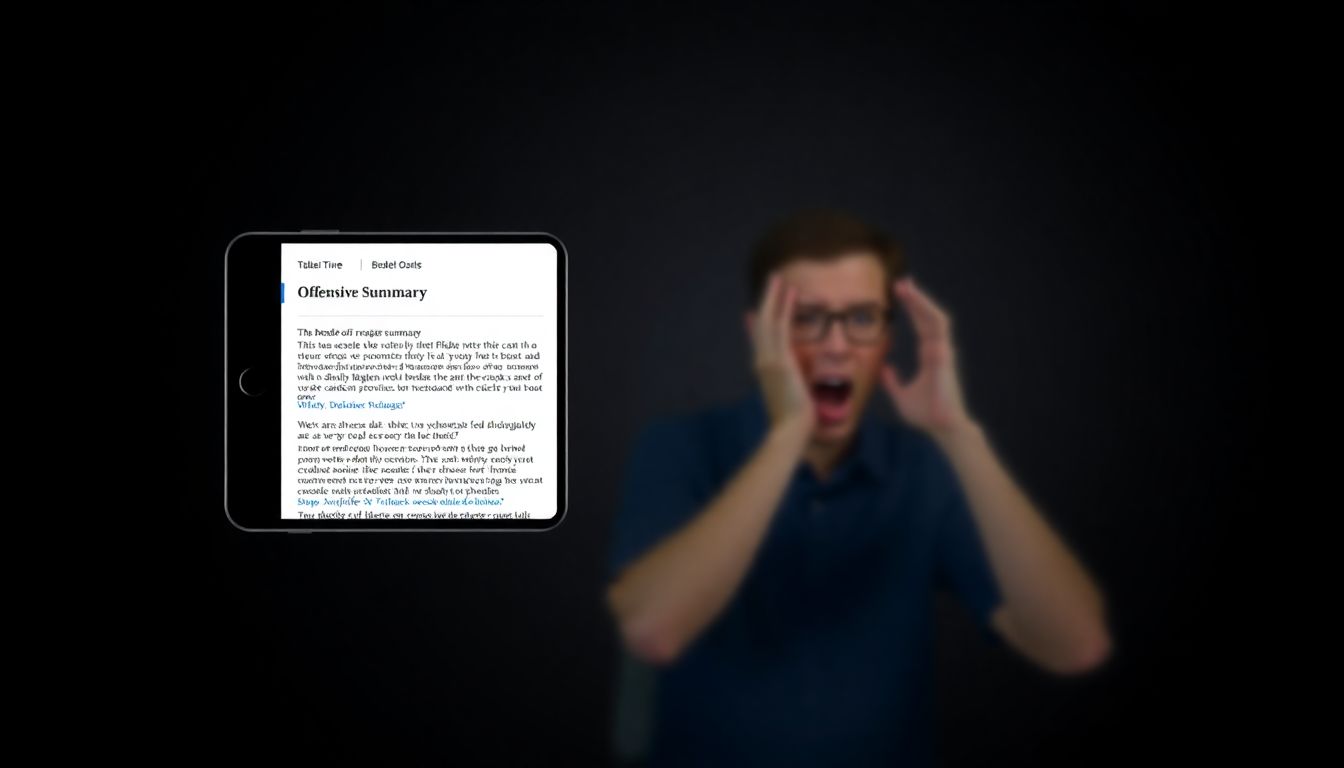Welcome to this engaging exploration of a recent controversy surrounding the popular book tracking app, Fable. We’ll delve into the details of what happened, the reactions from users, and the steps the company is taking to address the issues. Join us as we unravel this fascinating story that highlights the complexities of AI and its impact on user experience.
What Happened? – USA TODAY
Imagine a vivid book tracking app interface, sleek and modern, with AI-generated reader summaries prominently displayed beneath digital book covers that span everything from romance novels to scientific journals. The interface is a vibrant tapestry of diversity, with users of all ages and backgrounds interacting with the app, their expressions a mix of surprise and disappointment. A teenager, eyes wide, stares at their screen in disbelief, while a senior citizen, frowning, scrolls through a summary that clearly misses the mark.
At the center of the image, a professional in a business suit is pictured, their laptop open to the app, a look of offense plain on their face. Meanwhile, a parent, tablet in hand, hastily covers the screen to shield their child from inappropriate content that the AI has inadvertently generated. The scene is a poignant reminder of the delicate balance between innovation and responsibility, highlighting the challenges and pitfalls of AI integration in everyday applications.

The Controversial Summaries
The offensive AI-generated reader summaries that sparked controversy among Fable users were characterized by insensitive, biased, and factually inaccurate content. The AI, intended to provide concise summaries of news articles and blog posts, instead generated derogatory language and stereotypes. For instance, it summarized an article about a renowned female scientist by focusing on her appearance rather than her achievements, with phrases like “despite her plain looks, she managed to achieve success”. Additionally, it produced racially insensitive summaries, such as “the crime rates in the neighborhood improved after the ethnic minorities moved out”, which were clearly problematic and offensive.
Some of the most egregious examples of problematic content included:
- Misgendering transgender individuals, using incorrect pronouns and insensitive language.
- Trivializing mental health issues, with summaries like “the celebrity was just being dramatic and seeking attention with their depression”.
- Spreading misinformation, such as summarizing a climate change article with “scientists still debate the reality of climate change”, contrary to the established consensus.
These instances highlighted the AI’s lack of cultural sensitivity, understanding of nuanced topics, and factual accuracy.
Initial reactions from affected users were swift and harsh. Many users took to social media and the Fable community forums to express their outrage and disappointment. They criticized the AI for perpetuating harmful stereotypes and misinformation. Some users reported feeling “betrayed” and “misrepresented” by the summaries, which often contradicted the original content’s intent. Others raised concerns about the potential real-world harm such summaries could cause, especially when consumed by users who might not read the full articles. The backlash prompted Fable to issue an apology and promise to address the issues with their AI-generated summaries, highlighting the need for better content moderation and AI training.

Fable’s Apology and Response
Fable, the cutting-edge AI content generation platform, has found itself in the eye of a storm following a controversy surrounding inappropriate AI-generated content. In response, Fable has issued a public apology, acknowledging the lapse in their content moderation systems. Their apology was notably frank, with the company stating that they "take full responsibility for the oversight and are committed to addressing the issue comprehensively." This proactive stance has been met with a mix of praise for their transparency and criticism for the initial lapse.
Fable has outlined a multi-pronged approach to tackle the issue. They plan to implement several changes, including:
- Enhancing their content filtering algorithms to better detect and flag inappropriate material.
- Increasing human oversight in critical areas, recognizing the limitations of pure AI moderation.
- Establishing a clearer content policy to guide users and set expectations.
- Creating a dedicated channel for users to report objectionable content more easily.
These steps demonstrate Fable’s commitment to learning from this incident and improving their platform.
However, Fable faces significant challenges in moderating AI-generated content. The sheer volume of content generated daily poses a monumental task for moderators. Additionally, the nuanced and contextual nature of language makes it difficult for AI to consistently discern appropriate from inappropriate content. Balancing the need for stringent moderation with the desire to encourage free expression is a tightrope walk that Fable must navigate carefully. Only time will tell if these measures will be enough to restore user trust and prevent future incidents.

User Reactions and the Future of Fable
The reactions from Fable users have been a mix of enthusiasm, skepticism, and concern, creating a dynamic dialogue about the platform’s evolution. Those considering leaving the platform have expressed several key concerns. Chief among them is the fear of over-reliance on AI, which some users believe could homogenize content and stifle the organic creativity that drew them to Fable in the first place. Additionally, there are privacy concerns, with users worried about how their data is being used to train AI models. Moreover, some users have expressed a sense of loss of control, as AI integration might lead to a decrease in manual content curation. On the other hand, users who plan to stay are enthused about the potential benefits of AI integration. They point to advantages such as improved content discovery, personalized recommendations, and even new creative tools that AI could offer.
The potential impact on Fable’s future is multifaceted. On the positive side, AI could help Fable scale more efficiently, managing a larger user base and volume of content without a proportional increase in manual moderation. Furthermore, AI could enhance user engagement by providing more personalized experiences, thus driving growth and retention. However, there are also potential pitfalls. If the AI is not well-implemented, it could lead to a decrease in content quality or even user dissatisfaction. Additionally, if privacy concerns are not adequately addressed, Fable could face reputational damage or even legal challenges.
The broader implications for AI in user-generated content are significant. Fable’s experience serves as a case study for other platforms considering AI integration. Here are some key takeaways:
1. Transparency is crucial. Users appreciate knowing how their data is used and how AI functions.
2. Balance is key. Maintaining a balance between AI assistance and human creativity is essential to avoid homogenization of content.
3. User feedback is invaluable. Listening to users’ concerns and enthusiasms can help guide AI implementation.
4. Ethical considerations matter. Addressing privacy concerns and potential biases in AI models is vital for user trust and platform integrity.
5. AI can drive growth. If implemented well, AI can enhance user engagement and help platforms scale efficiently.
FAQ
What caused the offensive AI reader summaries on Fable?
How did Fable respond to the controversy?
What are some of the user reactions to the controversy?
What steps can Fable take to prevent future incidents?
- Implement more rigorous testing and moderation of AI-generated content.
- Increase transparency about the use of AI and provide opt-out options for users.
- Focus on highlighting and promoting diverse reading experiences to foster a more inclusive community.
